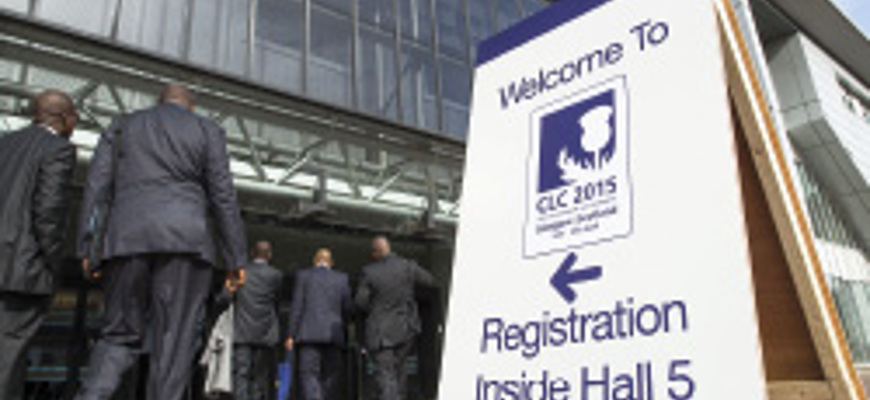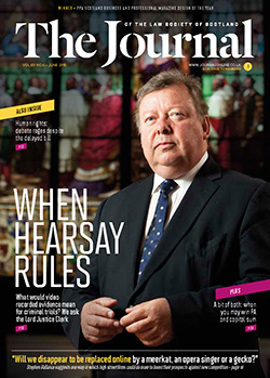In-house and in-tune in the Commonwealth

On Tuesday 14 April, at the 19th Commonwealth Law Conference in Glasgow, the session “In-house, in demand and in the Commonwealth” was held, chaired by Bruce Beveridge, a past President of the Law Society of Scotland and current chair of the Centre for Rural Development.
The speakers’ panel comprised three impressive female lawyers, who gave the audience an insight into each of their roles as an in-house counsel in their respective Commonwealth countries, the challenges they face in their working lives and how they meet them. As Beveridge commented: “The in-house legal function is more vibrant than ever before: it is both flourishing and at different stages in the evolutionary cycle right across the Commonwealth. While the context varies – sometimes widely – the core principles, ethos and approach for those who work in-house do not. This session demonstrated the energy, commitment and passion that today is synonymous with the sector, from three quite different but equally compelling perspectives.”
Lorna Nyandat, Kenya
First to the lectern was Lorna Nyandat, head of legal and regulatory affairs at AccessKenya Group, a corporate internet service provider. There was in Kenya, she said, a perception that an in-house counsel was a paper-pusher, a mere functionary shuffling sheaves of documents all day, occasionally rubber-stamping an executive decision. This was a perception Nyandat was keen to dispel. In her role at AccessKenya, Nyandat acted as company secretary, managed and defined the role of external counsel, dealt with contractual matters, provided legal awareness sessions for staff members and handled all regulatory matters on behalf of her client.
She explained that, in Kenya today, in-house counsel had to play both a legal and a business role; they were “corporate gatekeepers” and “the conscience of their organisation” whose foremost duty was to protect the interests of the shareholders. If performing those duties meant making enemies, one must, fearlessly, make enemies.
One of the principal aggravations of Nyandat’s current role was that some executives showed scant interest in the workings of the law; they wanted to know simply “Can I do this or not? Yes or no?”, evincing little curiosity as to the reasoning behind her response, positive or negative. These constraints on communication, she felt, informed the challenges she had to face: significant among those she had to manage or mitigate were that unwelcome decisions had the potential to lead to a loss of favour with decision-makers and to counsel being viewed as “a barrier between management and their goals”.
Barbara Wuttor-Asem, Ghana
Barbara Wuttor-Asem was the next speaker, standing in for the billed Ros Harrison. Wuttor-Asem is a public service in-house counsel, head of legal at the Ghana Standards Authority and, as a member of the Ghana Bar Association, also a practising barrister. She spoke about donning the mantle of in-house counsel in Ghana.
She explained that in-house lawyers are routinely employed in both private and public sectors in Ghana. The advantage of employing in-house legal expertise was that counsel was readily accessible to management and able to build expertise in the company’s functions. In her own role she acted as board secretary, dealt with employee-related issues, handled commercial agreements, managed external counsel and offered general legal advice. An in-house counsel was, she said, “a jack of all trades and master of the core competencies of the organisation”.
Wuttor-Asem was emphatic about the importance of in-house counsel engaging – and being seen by management to engage – with the core activities of the organisation. In-house counsel was not employed merely to firefight, and in order to be able to advise effectively, in-depth knowledge of the employer’s mandate, its pursuits and ambitions, its processes and procedures was essential. However, that did not mean in-house counsel required to possess a comprehensive knowledge of all law – that would be unrealistic – rather, it was about knowing where, and from whom, to find the relevant law that promoted the interests of the organisation while ensuring that it operated in compliance with statutory regulations. The in-house lawyer who acquired such erudition was indispensable to their employer.
Rebecca Murdock, Canada
The third and final speaker was Rebecca Murdock, staff counsel at the International Brotherhood of Electrical Workers, a trade union based in the Canadian province of British Columbia. In her position as in-house counsel, Murdock reports to the chief executive officer and business manager of the union. Her day-to-day work involves conducting a high volume of litigation on workers’ compensation matters and attending grievance arbitrations, at both of which she represents union members. It is part of her function to protect the business interests of the union: there is an element of responsibility to shareholders, but only insofar as the shareholders’ interest relates to union business. Her paramount allegiance is to the union membership.
Like her fellow speakers, Murdock acts as conduit between external counsel and union management. Echoing Wuttor-Asem’s pronouncement on the need for in-house counsel to have a solid grasp of the employer’s core functions, Murdock has an “inside out” familiarity with the collective agreement under which the union operates.
Competing interests can cause difficulties, for example if there is a complaint by members against the union, or where a balance has to be struck between protecting employee privacy and ensuring the employer’s, and the workforce’s, right to get the job done safely. Safety is the primary concern of workforce and employer alike, and always comes first.
While she is not herself a union member, and does not attend union meetings, Murdock’s aim is always to ensure that the members are fairly treated by the employer.
Questions and answers
A short question-and-answer session followed the presentations, and the following were discussed:
Assisting staff
On the question of providing legal advice to staff members, Nyandat’s response was characteristically forthright: “You are not their lawyer,” she said. For Wuttor-Asem “a certain distance” was sanative. Murdock advocated an “arm’s length” distance, but she does prepare wills for union members and represents them in uncontested divorces. One suspects the latter are rare beasts, even in peace-loving Canada. Beyond this, members are gently directed towards independent legal advice.
External counsel
On outsourcing, Nyandat responded that at AccessKenya external counsel did not have direct contact with company personnel. On her watch, everything of a legal hue was routed through the internal legal department. No staff members should issue instructions to external counsel, not even management. External counsel could not be expected to know everything about the central workings or internal policies of the company. However, they should be expected to make the effort to acquire sufficient understanding of the business to allow them effectively to represent the company in court.
This was a sentiment shared by Wuttor-Asem: while there was an expectation that in-house counsel should know everything about the company, external counsel could not be relied on to possess the same knowledge. For that reason, when external advice was required, close liaison with the instructing in-house counsel was vital.
Murdock referred only the odd matter to outside counsel and, as noted above, translated external advice for the CEO, for whom cost is always a business driver.
Impartiality
As to impartiality, Nyandat opined, succinctly, that one simply had to know where to draw the line between impartiality and loyalty. Wuttor-Asem supplemented this by observing that all Ghanaian lawyers, whether in-house or in private practice, were bound by the rules of the Legal Profession Act, which prescribed standards of professional conduct for lawyers.
Privilege
Nyandat said that, in Kenya, the concept of privilege was enshrined in the Evidence Act. When a client disclosed information, the purpose of which was “to facilitate good legal advice”, no court would seek to have that information disclosed. She pointed out that the employer would assume that everything discussed with a lawyer would be covered by privilege, and it was incumbent on the lawyer to make sure that the client was told exactly what was covered by privilege and what was not. It was good practice always to put legal opinion into writing; this acted as a safeguard against the propensity of the employer always to blame the lawyer when things, as inevitably they sometimes do, gang agley.
Wuttor-Asem concurred, adding that, while counsel’s first responsibility was generally to their employer, that counsel was compelled to comply with the Government’s statutory regulations covering legal practice, including privileged communications.
Murdock said, unambiguously, that solicitor/client privilege existed with the union.
Conclusion
All in all, this was an engaging and entertaining session with three experienced and confident in-house lawyers. Despite operating in quite diverse fields, there was a good deal of similitude in the substance of their working lives and ethos. To paraphrase two recently departed UK political party leaders, there seemed to be more that bound than divided them. Had time permitted, it is likely that a lot more could have been said at this session.
In this issue
- Weighing the risks
- Private parking fines – are they enforceable?
- Scotland – home of (dangerous) golf
- Shareholder details: the right to refuse
- Perils of the owner-occupied croft (fuller version)
- Reading for pleasure
- Opinion: Thomas Ross
- Book reviews
- Profile
- President's column
- Land Register completion: one year in
- People on the move
- Rights: whose final say?
- The word on the street
- Screen test
- Making the best of mediation
- Keep up the payments
- The right priorities
- When reputation is not enough…
- Sports justice – being seen to be done?
- Source of disputes
- CML Handbook: the new deal
- Perils of the owner-occupied croft
- In-house and in-tune in the Commonwealth
- Stair Society seeks new blood
- New Build Standard Clauses revised
- Law reform roundup
- Leven's last hole rarely in benevolent mood
- Year of the new look
- AML just became simpler
- "My time is valuable!" Oh really?
- Learning opportunity
- Ask Ash
- Technology: slave or master?






